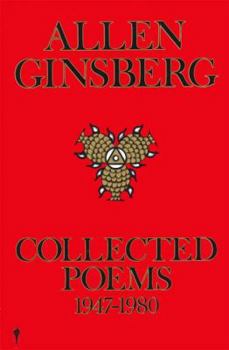Collected Poems 1947-1980
Select Format
Select Condition 
Book Overview
Gathered here for the first time is the verse of three decades of one of America's greatest poets. Collected Poems 1947-1980 includes all writings in the groundbreaking paperback volumes published by City Lights Books, the contents of many rare pamphlets issued by small presses, and, finally, some notable texts hitherto unpublished--one, "Many Loves," withheld "for reasons of prudence and modesty," is an erotic rhapsody dating from the historic "San Francisco Renaissance" era.
Allen Ginsberg is, of course, a chief figure in the group of writers (among them Kerouac, Corso, Ferlinghetti, Creeley, Duncan, snyder, and O'Hara) who, in the Bay Area and in New York in the 1950s, began to change the course of American poetry, liberating it from closed academic forms by the creation of open, vocal, spontaneous, and energetic postmodern verse in the tradition of Whitman, Apollinaire, Hart, Crance, Pound, and William Carlos Williams. Within a decade, Ginsberg's classics "Howl," "Kaddish," and "The Change" would become central in leading American (and international) poetry toward uncensored vernacular, raw candor, the ecstatic, the rhapsodic, and the sincere--al leavened, in Ginsberg's work, by an attractive and pervasive streak of common sense.
These raw tones and attitudes of spiritual liberation helped catalyze a psychological revolution that has become a permanent part of our cultural heritage, profoundly influencing not only poetry and popular song and speech but also a generation's view of the world. Even the literary establishment, hostile at first toward the revolutionary new spirit, has recognized Allen Ginsberg's achievement by honoring him with a National Book Award and membership in the American Academy and Institute of Arts and Letters.
The uninterrupted energy of Ginsberg's remarkable career--embodying political activism as well as Buddhist spiritual practice--is clearly revealed in this volume. Seen in the order of composition, the poems reflect on one another; they are not only works but also a work. Here are the familiar anthology staples "Sunflower Sutra" and "To Aunt Rose"; the great antiwar poem "Wichita Vortex Sutra"; "Wales Visitation" (an extraordinary nature ode inspired by psychedelic experiments); the much-translated elegy "September on Jessore Road" and the meditative fantasy "Mind Breaths," followed by the haunting "Father Death Blues" and a later heroic, full-voiced "Plutonian Ode," addressed to "you, Congress and American people." Among the recent poems are the delicate familiar anecdotes in "Don't Grow Old"; "Birdbrain ," a savage political burlesque; and the new-wave lyric "Capitol Air."
Adding to the splendid richness of this book are illustrations by Ginsberg's artist friends; unusual and illuminating notes to the poems, inimitably prepared by the author; extensive indexes; and prefaces and other materials that accompanied the original publications.
Related Subjects
Poetry





